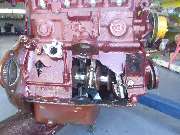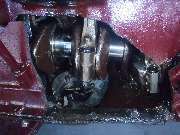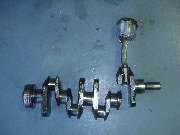The MGA With An Attitude
Using 5-Main Bearing Crankshaft in 3-Main Bearing Block - PP-201B
I don't know who thinks up these things, but here goes.
On May 30, 2013, Mark T Boldry in Gold Coast, Australia wrote:
 "Has anyone had any success with putting a 5 bearing (MGB) crankshaft into a 3 bearing MGA cylinder block?" "Has anyone had any success with putting a 5 bearing (MGB) crankshaft into a 3 bearing MGA cylinder block?"
It has been done. For the MGB 3-main bearing block the 5-main bearing crankshaft is apparently a drop-in. Use the engine rear plate that matches the gearbox to be mated. For the MGA 1622cc engine the main bearing cradles in the block have to be line bored to accept larger diameter bearings. For the MGA 1500/1600 blocks the main journals have to be bored larger, and the center main cradle has to be machined a little narrower where the crankshaft thrust washers will seat. When putting a 5 main crank into a 3 main block, you have to use the 5 main connecting rods as well. Then you need a flywheel from a 1965-1967 MGB with the GB engine, in order to mate it to a 3-synchro gearbox (along with spigot adapter bushing, bored out MGA engine rear plate, and other considerations for mating a 5-main engine to a 3-synchro gearbox.
This leaves the intermediate main bearings (#2 & #4) thrashing around in the air. Bear in mind that webs between the bearings are thinner on the 5-main crankshaft. Using a complete MGB 3-main bearing engine (main bearings larger diameter than MGA) should be plenty strong for a street car. I doubt that a 5-main crank with #2 and #4 mains unsupported is stronger than an MGB 3-main crank. Three main cranks are getting hard to find and 5 main cranks are plentiful (which may be the only reason for attempting this folly). In SCCA racing, MGAs can use the 3 main MGB block sleeved down to 1622cc (+.047" bore). Using the beefier 3 main (or 5 main) crank is less expensive than getting a billet MGA crank.
On 6/2/2013, Dave Godwin wrote:
 "You may be interested to see what happens when you put a 5-bearing crank in a 3-bearing motor. Birdcage A was racing at Lakeside and was flying 6000rpm down the main straight when a bang shook the MGA and the oil light came on! Wonder why! The 5-bearing crank webs are thinner than the 3-bearing webs (so I found out after the event) and simply tore apart. We found a tear on the last web too"! "You may be interested to see what happens when you put a 5-bearing crank in a 3-bearing motor. Birdcage A was racing at Lakeside and was flying 6000rpm down the main straight when a bang shook the MGA and the oil light came on! Wonder why! The 5-bearing crank webs are thinner than the 3-bearing webs (so I found out after the event) and simply tore apart. We found a tear on the last web too"!



On 6/2/2013, Richard Line wrote:
 I have a five in my "A" engine and have no problems with it. It's been in place since approx 2005". I have a five in my "A" engine and have no problems with it. It's been in place since approx 2005".
On 6/2/2013, Dave Godwin wrote:
 "A good MGA racing friend of mine has had his 5-bearing crank in his MGA since 2007 and has raced successfully in Australia and the UK with that motor". I am going to stick with 3-bearing cranks from now on! This was NOT an oil problem. The main and big end bearing surfaces are pristine! The rotating parts were all balanced from the harmonic balancer to the clutch! Eight races and one tear and one torn crank flange later! "A good MGA racing friend of mine has had his 5-bearing crank in his MGA since 2007 and has raced successfully in Australia and the UK with that motor". I am going to stick with 3-bearing cranks from now on! This was NOT an oil problem. The main and big end bearing surfaces are pristine! The rotating parts were all balanced from the harmonic balancer to the clutch! Eight races and one tear and one torn crank flange later!
On 6/3/2013, Richard Rose in Australia wrote:
 "I am not surprised, as I have seen it happen before. I have been involved in historic sports car racing since 1985. In my experience 5 bearing cranks in MGA engines don't last. It is only a matter of time before they let go. I would have seen at least half a dozen break since I started racing. "I am not surprised, as I have seen it happen before. I have been involved in historic sports car racing since 1985. In my experience 5 bearing cranks in MGA engines don't last. It is only a matter of time before they let go. I would have seen at least half a dozen break since I started racing.
 "Some years ago a member of the MG car club Sydney set up his MGA for racing. I advised him to fit a steel crank, but his engine builder told him a MGB 5 bearing would be okay. In the third race of his first meeting the crank let go. His engine builder said it was just bad luck, so he built up another with a 5 bearing crank. At his next meeting the crank let go in the second race (which would be some sort of record). He then decided to fit a steel crank in his third engine. This fixed the problem, but he gave up racing shortly after. I would definitely recommend not using a 5 bearing crank in a 3 bearing engine, as second hand MGB cranks are now 40 to 50 years old. The cost of a steel crank would be cheaper than having to rebuild blown engine". "Some years ago a member of the MG car club Sydney set up his MGA for racing. I advised him to fit a steel crank, but his engine builder told him a MGB 5 bearing would be okay. In the third race of his first meeting the crank let go. His engine builder said it was just bad luck, so he built up another with a 5 bearing crank. At his next meeting the crank let go in the second race (which would be some sort of record). He then decided to fit a steel crank in his third engine. This fixed the problem, but he gave up racing shortly after. I would definitely recommend not using a 5 bearing crank in a 3 bearing engine, as second hand MGB cranks are now 40 to 50 years old. The cost of a steel crank would be cheaper than having to rebuild blown engine".
|